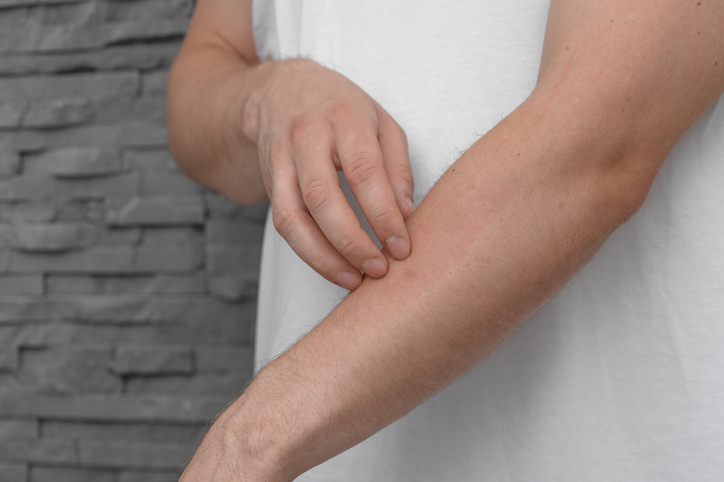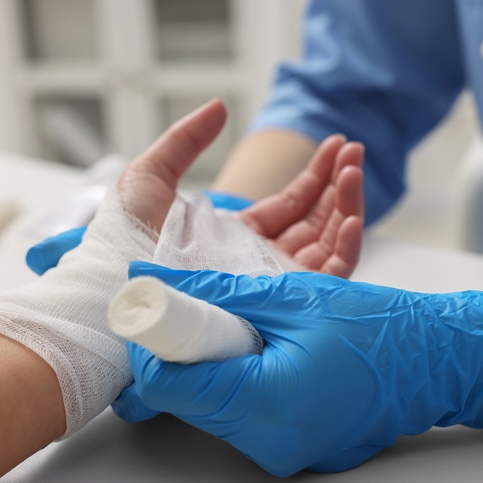AllCare is pleased to announce the opening of its newest location in Braselton, expanding access to high-quality, patient-centered healthcare for...
Insect Bite Treatment in Georgia
Expert Care for Insect Bites
When you need fast, reliable care for non-emergency issues, AllCare Primary & Immediate Care clinics are here to help. With multiple convenient locations across Atlanta, Alpharetta, Smyrna, Decatur, Buford, and other Georgia communities, we provide walk-in urgent care services for a wide range of medical concerns. Our experienced providers deliver timely, compassionate care for minor illnesses and injuries, so you can feel better, faster, without the long wait of an emergency room.

Types of Insect Bites and Symptoms
Different insects cause various types of bites, each with its unique characteristics, symptoms, and potential complications. The most common insect bites and the ones treated at AllCare Primary & Immediate Care include:
Mosquito Bites: Typically result in itchy, red bumps. In some cases, mosquitoes can transmit diseases like West Nile virus or Zika.
Tick Bites: Can cause localized redness and itching. Ticks are known for transmitting Lyme disease and Rocky Mountain Spotted Fever.
Bed Bug Bites: Appear as small, red welts, often in a line or cluster. They can cause significant itching and discomfort.
Flea Bites: Small, red bumps that are often grouped around the ankles or legs. Fleas can transmit diseases like typhus and plague.
Spider Bites: Symptoms vary depending on the spider species. Some spider bites can cause severe reactions, such as those from black widows or brown recluses.
Bee and Wasp Stings: Can cause immediate pain, redness, and swelling. Some individuals may experience severe, life-threatening, allergic reactions (anaphylaxis).
Scabies and Lice: These are infestations rather than typical bites, causing intense itching and rash.

Insect Bites and Stings Symptoms
The symptoms of insect bites can vary widely depending on the type of insect, the individual’s reaction, and whether the bite becomes infected. Understanding these symptoms can help in identifying the type of bite and determining the appropriate treatment. Here are some common symptoms associated with insect bites:
- Redness and Swelling
- Itching
- Pain and Discomfort
- Rashes
- Blisters or Pustules
- Systemic Reactions
How to Diagnose Insect Bites
Diagnosing insect bites accurately involves a streamlined process to identify the type of bite and determine the appropriate treatment. At AllCare Primary & Immediate Care, our approach includes three key steps:
- Patient History: Gathering a detailed patient history is crucial for accurate diagnosis. Your AllCare provider will ask about recent activities, travel history, and exposure to potential insect habitats. Knowing whether you’ve been hiking, camping, or traveling in areas known for specific insects can provide essential clues, as this context helps in narrowing down the type of insect responsible for the bite.
- Physical Examination and Symptom Review: The first step in diagnosing an insect bite is a thorough physical examination of the affected area. An AllCare provider will conduct an examination that will help in identifying characteristic features of different insect bites. Additionally, reviewing your symptoms—such as itching, pain, swelling, and any systemic reactions like fever or fatigue—provides valuable information about the severity of the bite and potential allergic reactions.
- Diagnostic Tests and Differential Diagnosis: In some cases, diagnostic tests are needed to confirm the type of insect bite or rule out other conditions. These tests may include skin swabs and cultures to check for bacterial infections, blood tests to detect evidence of infection transmitted by insect bites or organ damage, or allergy testing for severe reactions.


Online Doctor Visits and Telehealth Services
Experience the convenience of telehealth appointments at AllCare Primary & Immediate Care. Our telemedicine services are designed to provide you with seamless access to healthcare without the need to leave your home. Whether you need an online doctor’s appointment for immediate or primary care, AllCare’s got you covered. With our online telehealth services currently available to individuals located in Georgia, you can connect with our experienced urgent and primary care physicians via secure video calls.
At AllCare Primary & Immediate Care, we are expanding our virtual healthcare access to all services previously offered in person. This includes:
Frequently Asked Questions
How can I prevent insect bites?
Preventing insect bites involves several proactive measures. Use insect repellents containing DEET, picaridin, or oil of lemon eucalyptus to protect exposed skin. Wear long sleeves, pants, and hats when spending time outdoors, especially in high-risk areas.
Additionally, avoid outdoor activities during peak insect activity times, such as dawn and dusk. Control your environment by reducing standing water around your home to prevent mosquito breeding and keeping living areas clean to avoid bed bugs and fleas.
When should I see a doctor for an insect bite?
You should seek medical attention for an insect bite associated with persistent symptoms that do not improve with home treatment. Early intervention can prevent complications and ensure proper treatment. if you experience severe symptoms like difficulty breathing, swelling of the face or mouth, or chest pain, you should go to the emergency room.
Is telemedicine available for insect bite consultations?
Yes, AllCare Primary & Immediate Care offers telemedicine services for insect bite consultations. Through our secure video platform, you can discuss and showcase your symptoms to a physician from the comfort of your home. You will receive guidance on treatment options and preventive measures, making it convenient and accessible to get the care you need.
schedule your insect bite treatment appointment
The Latest Healthcare News
Check out our blog to learn more from our team about the latest medical advancements, health tips, and primary care news.
Lauren Schwartz, F.N.P.-C. of AllCare Appeared on “The Weekly Check-Up” Radio Show
Lauren Schwartz, F.N.P.-C. of AllCare Primary & Immediate Care appeared as a featured guest on “The Weekly Check-Up” on December 21, 2025. The...
AllCare’s Dr. Racheal Daniels Discusses Holiday Health and Primary Care on WSB-TV’s “Daily 2”
Dr. Racheal Daniels of AllCare Primary & Immediate Care recently appeared on WSB-TV’s Daily 2 to discuss the importance of prioritizing primary...








